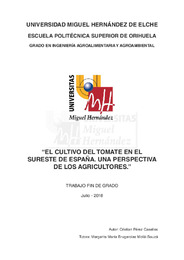Por favor, use este identificador para citar o enlazar este ítem:
https://hdl.handle.net/11000/5357Registro completo de metadatos
| Campo DC | Valor | Lengua/Idioma |
|---|---|---|
| dc.contributor.advisor | Brugarolas Mollá-Bauzá, Margarita | - |
| dc.contributor.author | Pérez Caselles, Cristian | - |
| dc.date.accessioned | 2019-10-21T16:06:53Z | - |
| dc.date.available | 2019-10-21T16:06:53Z | - |
| dc.date.created | 2018-07 | - |
| dc.date.issued | 2019-10-21 | - |
| dc.identifier.uri | http://hdl.handle.net/11000/5357 | - |
| dc.description.abstract | La actividad agraria en el Levante español está experimentando cambios importantes en los últimos tiempos. Existe una tendencia clara al monocultivo y a la sustitución de cultivos tradicionales en el territorio por otros que son mucho más productivos y que permiten obtener mejores resultados económicos. Estos factores tienen dos consecuencias fundamentales, por una parte, el abandono de la actividad agraria, con la consiguiente pérdida de ruralidad y, por otra parte, un efecto negativo en el mantenimiento de la biodiversidad, al desaparecer cultivares tradicionales, ahora en desuso. En este marco, el trabajo analiza la situación de los productores de un cultivo tradicional en Levante, el tomate. Para conocer la situación actual y la previsión futura se han realizado 40 entrevistas en profundidad a productores de tomate. El análisis de la información obtenida permitirá proponer actuaciones adecuadas para el mantenimiento de las variedades tradicionales. | es |
| dc.description.abstract | Agricultural activity in Southeast of Spain is changing emphatically in the last times. There is a clear trend to monoculture and the substitution of traditional crops for others which are more productive and allow to get better economic results. These factors have two fundamental consequences. On the one hand, the abandonment of agricultural activity, with the consequently loss of rurality. On the other hand, a negative effect in the maintenance of biodiversity, because traditional varieties disappear. In this context, the work analyses farmers’ situation of a traditional crop in Southeast of Spain: the tomato. To know the actual situation and the future forecast have been made 40 depth interviews to tomato farmers. The analysis of the information obtained will allow to propose suitable actions for the maintenance of traditional varieties. | es |
| dc.format | application/pdf | es |
| dc.format.extent | 71 | es |
| dc.language.iso | spa | es |
| dc.rights | info:eu-repo/semantics/openAccess | es |
| dc.subject | Tomate | es |
| dc.subject.other | CDU::6 - Ciencias aplicadas::63 - Agricultura. Silvicultura. Zootecnia. Caza. Pesca::633 - Cultivos y producciones | es |
| dc.title | El cultivo del tomate en el sureste de España. Una perspectiva de los agricultores | es |
| dc.type | info:eu-repo/semantics/bachelorThesis | es |

Ver/Abrir:
TFG Pérez Caselles, Cristian.pdf
1,4 MB
Adobe PDF
Compartir:
 La licencia se describe como: Atribución-NonComercial-NoDerivada 4.0 Internacional.
La licencia se describe como: Atribución-NonComercial-NoDerivada 4.0 Internacional.
.png)